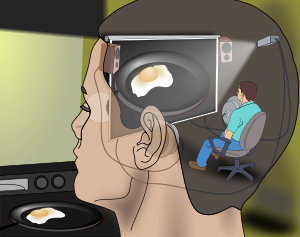
Cartesian theater
Encyclopedia

Daniel Dennett
Daniel Clement Dennett is an American philosopher, writer and cognitive scientist whose research centers on the philosophy of mind, philosophy of science and philosophy of biology, particularly as those fields relate to evolutionary biology and cognitive science. He is currently the Co-director of...
to pointedly refer to a defining aspect of what he calls Cartesian materialism
Cartesian materialism
In philosophy of mind, Cartesian materialism is the idea that at some place in the brain, there is some set of information that directly corresponds to our conscious experience...
, which he considers to be the often unacknowledged remnants of Cartesian dualism in modern materialistic
Materialism
In philosophy, the theory of materialism holds that the only thing that exists is matter; that all things are composed of material and all phenomena are the result of material interactions. In other words, matter is the only substance...
theories of the mind
Mind
The concept of mind is understood in many different ways by many different traditions, ranging from panpsychism and animism to traditional and organized religious views, as well as secular and materialist philosophies. Most agree that minds are constituted by conscious experience and intelligent...
.
Descartes originally claimed that consciousness
Consciousness
Consciousness is a term that refers to the relationship between the mind and the world with which it interacts. It has been defined as: subjectivity, awareness, the ability to experience or to feel, wakefulness, having a sense of selfhood, and the executive control system of the mind...
requires an immaterial soul, which interacts with the body via the pineal gland
Pineal gland
The pineal gland is a small endocrine gland in the vertebrate brain. It produces the serotonin derivative melatonin, a hormone that affects the modulation of wake/sleep patterns and seasonal functions...
of the brain. Dennett says that, when the dualism is removed, what remains of Descartes' original model amounts to imagining a tiny theater in the brain where a homunculus
Homunculus
Homunculus is a term used, generally, in various fields of study to refer to any representation of a human being. Historically, it referred specifically to the concept of a miniature though fully formed human body, for example, in the studies of alchemy and preformationism...
(small person), now physical, performs the task of observing all the sensory data projected on a screen at a particular instant, making the decisions and sending out commands. (cf the Homunculus argument
Homunculus argument
The homunculus argument is a fallacy arising most commonly in the theory of vision. One may explain vision by noting that light from the outside world forms an image on the retinas in the eyes and something in the brain looks at these images as if they are images on a movie screen The homunculus...
).
The term Cartesian Theater was brought up in the context of the Multiple Drafts Model
Multiple Drafts Model
Daniel Dennett's multiple drafts model of consciousness is a physicalist theory of consciousness based upon cognitivism, which views the mind in terms of information processing. The theory is described in depth in his book, Consciousness Explained, published in 1991...
that Dennett posits in Consciousness Explained
Consciousness Explained
Consciousness Explained is a 1991 book by the American philosopher Daniel Dennett which offers an account of how consciousness arises from interaction of physical and cognitive processes in the brain.-Synopsis:...
(1991):

